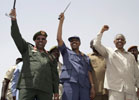
Some strong reactions to the op-ed I wrote with George Clooney yesterday, published in USA Today, prompt me to follow up with some additional thoughts that we weren’t able to convey in a 600 word article. In the piece, we wrote:
U.S. officials can […] build leverage in support of peace by presenting a Door 1 vs. Door 2 scenario, in which good outcomes would result from peace, and serious consequences would be triggered by war. Parallel carrots and sticks are the key to this approach.
On the carrots side, the U.S. should present a quid pro quo with an expiration date by the end of the year: In exchange for peace in Darfur and the South, the U.S. would move to normalize relations with Sudan and work in the U.N. Security Council to suspend the war crimes indictment of President Omar Hassan al-Bashir under Article 16 of the International Criminal Court charter. On the sticks side, a U.S.-led initiative should build international support for severe consequences for anyone promoting war, whether they are ruling party officials, militias, rebels, or southern Sudan’s leaders.
This in no way diminishes my (or Enough’s) belief that – in light of the pattern of Sudan’s ruling National Congress Party to renege on its written agreements and work behind-the-scenes to undermine peace – multilateral sticks remain the greatest tool with which to promote policy and behavior change on the part of the NCP. Promoting parallel carrots is required to increase the chances of being heard by Obama administration officials and allies who do not respond to a sticks-only message, and to increase the odds that the NCP will actually alter its behavior in favor of peace if there is a real prospect of achieving some of its foreign policy goals with respect to its relations with the rest of the world.
This op-ed is in part a response to Special Envoy Gration’s recent comments that the U.S. does not have any leverage in Sudan, a view that appears to be shared by others in the Obama administration. That view is wrong. I’m working with my colleagues at Enough now on a report that will spell out eight areas in which the U.S. already has leverage it is not utilizing, and proposes five more ways to increase that leverage. One of those ways is for the U.S. to work internationally to build the kind of package of incentives and pressures that Clooney and I write about in the op-ed.
Article 16 was specifically included in the ICC charter to give countries leverage where there might appear to be none, and only in support of peace. The Article 16 deferral only lasts a year, and is conditioned on fulfilling the terms of the original deferral. So if the condition for deferment is a peace deal in Darfur, full implementation of the CPA, no support for violence or conflict in the South, respect for the referendum process and its results, and respect for human/civil rights in Sudan – certainly monumental hurdles when we consider the past 21 years of NCP rule – that bar has to be met and re-met every year. This means that the leverage inherent in an Article 16 deferral isn’t a one-off instrument, but rather an ongoing point of influence, which, if we utilize it, actually lends further credence to the ICC.
Even if the Obama administration wanted to, the U.S. would be hard-pressed to sell a sticks-only approach to its allies internationally. By putting some heft into the carrots, we have a better chance at securing the pressures that we believe will influence the NCP’s calculations most decisively. Most importantly, our ultimate objective is peace in Sudan, undergirded by accountability. If the NCP met a set of very strict conditions like the ones we propose above, I would support invoking Article 16. Indeed, Sudan would look like a very different place if the U.S. got to the point of calling for the U.N. Security Council to recommend a deferral. But I would be the first in line to argue for a revocation of the deferral if the NCP violated its terms in the slightest, just as Charles Taylor did in West Africa. It should also be noted that part of the package of sticks should be increased support from the United States for the apprehension effort of the Sudanese indictees.
In recent years, because the Bush and Obama administrations have done such a poor job of marshaling support for multilateral pressures, we have focused inordinately on advocacy for such pressures to counter their propensity to offer carrots. This tactic on our part led many to conclude we simply wanted to hammer the NCP no matter what the facts. The position we took in the op-ed is an attempt to recalibrate our message back to its original form, where we advocate for both sticks AND carrots – not just as they relate to the NCP’s behavior in a single context, but in promotion of peace for the country as a whole.
Photo: President Bashir and supporters (AP)

